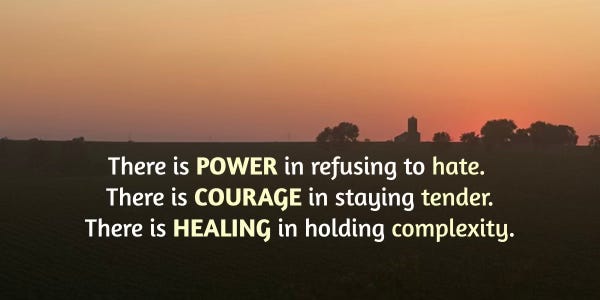I’ve been told I’m “off the charts” as an empath by an industrial psychologist. I did not appreciate his words when he spoke them.
To be candid, his words were triggering in a not-so-good way. At the time, my role was that of CIO in a highly pressurized, male-dominated construction services company. I feared that I was coming across as “soft.” Fortunately, he helped me realize that empathy was one of my superpowers. His “diagnosis” contributed to my decision to utilize my three-plus decades of experience in IT leadership roles to become an executive coach. And maybe that explains why I find it nearly impossible to hate anyone.
That’s not to say I don’t feel anger or heartbreak. I do. Deeply. I feel disappointment, grief, and even fury when people cause harm or show cruelty.
But hate? It just doesn’t take root in me.
Not because I’m better or more enlightened, but because I feel too much. When I see someone lash out, I can’t help but wonder what pain they’re carrying. When someone does wrong, my mind often drifts to what happened to them, not just what they did.
Hate is heavy. It’s corrosive. And my spirit can’t carry it.
That doesn’t mean I excuse harm or stay silent. Empathy doesn’t mean surrender. In fact, it gives me the strength to stand firm, without dehumanizing the other. To draw boundaries without drawing blood. To resist injustice without letting it poison my soul.
There’s power in refusing to hate.
Because hate narrows the mind and poisons the heart, it urges quick judgment and fuels division. When we refuse to hate, we choose to maintain our dignity, even when others abandon theirs. We prefer clarity over chaos, humanity over hostility. That is power: not control over others, but control over yourself.
There’s courage in staying tender.
Tenderness is vulnerable, and vulnerability requires strength. When the world feels harsh, staying soft can feel like exposure. But that’s exactly why it’s brave. To care deeply, to remain kind, to feel and think without numbing; that’s not weakness. That’s resilience in its truest form. It’s the willingness to stay human in an increasingly hardened world.
There’s healing in holding complexity.
Life is not black and white. People are neither heroes nor villains. Holding complexity means allowing space for contradiction, nuance, and both/and perspectives, rather than adhering to either/or. It’s seeing the harm and still holding the humanity. It’s being able to say: “This is wrong, and this person is still more than their worst moment.” That kind of thinking is what makes reconciliation possible—internally and collectively.
Why does this matter for leadership?
Because leadership isn’t just about decision-making and strategy, it’s about people. It’s about holding space for conflict, ambiguity, emotion, and growth. The best leaders don’t lead from fear or ego; they lead from a place of groundedness, compassion, and clarity.
Refusing to hate keeps you steady in the face of opposition. It helps you respond rather than react.
Staying tender keeps your team human. It allows you to be a source of trust, not fear.
Holding complexity enables you to navigate uncertainty with wisdom instead of false certainty.
In a world hungry for swift answers and clear-cut solutions, the kind of leadership that prioritizes empathy over ego, clarity over cruelty, and nuance over noise is rare yet necessary.
How do you respond when you’re hurt or tested?
Do you find yourself pulling away… or reaching in?
I’d love to hear what grounds you when the world gets loud and heavy.
I am here for you if you want to talk about it.





